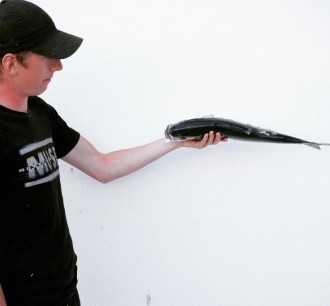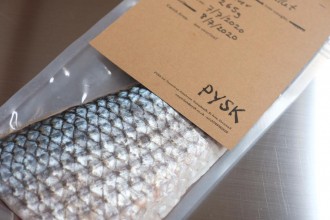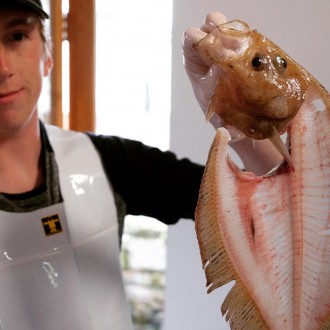Before COVID-19 and lockdown, Giles was busy building and repairing boats and Sarah was designing and developing websites. When their projects were either cancelled or put on hold they saw both a problem and an opportunity. Before long, and with some support from the Fishmongers’ Company’s Fisheries Charitable Trust and Seafarers UK’s Rapid Response Grant Programme, Pysk was born, delivering fish boxes packed with seasonal seafood, caught from Cornwall’s day boats. Here Giles tells Pysk’s story and outlines their future ambitions.

The opportunity began as more of a social endeavour than a business. We thought we could provide a local service, picking up a box of fish from a friend who runs a local day trawler and driving it around to housebound individuals the following morning. This worked in some ways and didn’t in others. We found that we had a long list of people to visit all over the place, many of whom were friends we hadn’t seen in a while. I am quite chatty and hard to shut up, so the round took an awfully long time! At the end of the day, we’d either run out of fish or had leftover that we didn’t know how to deal with. Everybody was happy with the fresh, whole fish and we were very tired.

It was around this time that we applied to the Fishmongers’ Company for a Rapid Response Grant to help us with processing, packing and transporting fish, then blast freezing what was left from that day. They awarded us enough money to enable us to buy a filleting station, vacuum packer, a blast freezer and equipment that has enabled us to improve the quality of our products, supply individuals nationwide as well as some local shops and to reduce our waste.
silverWhat we learnt from these first few weeks gave us some thoughts on what we’d like to take with us and what we thought best parked. Sarah and I both like the idea of fish from local dayboats for many reasons. We like that the smaller boats spend shorter periods at sea and so provide fresher fish. We like that we are in contact with the fishers and so know that they use various techniques to look after the fish, such as bleeding, careful washing, slush icing and stacking in small boxes that don’t squash or damage the fish. Some of the boats have even taken me out fishing and shown me their processes. So, whether we buy their fish from the market or directly from the boat, we know how it’s been caught and handled. Cornwall Good Seafood Guide have also been highly informative and supportive of our ideas and have even visited us to share thoughts.
MAPWe want to be able to pass on our enthusiasm for these boats and their fish. In order to do this, we record the landing and packing dates of our fish, where it was caught, by whom and how for the consumer to see; we track the boats that we buy from using Marine Traffic (publicly available community-based facility), note their locations and draw these on the info slip included with each fish. Our customers have told us that they enjoy the information they receive in their box of fish. They also enjoy that we use only recyclable card and paper packaging (except the vacuum pouches). We don’t promise to dispatch the day of order, or even the next, because we depend on small dayboats and they depend on fine weather. Sometimes this may take the best part of a week, but we promise to deliver high quality seasonal fish within about 48 hours of landing.

The fishers we know are incredibly supportive of our project Pysk. I recently asked James Pascoe if he or his dad would be going out in the morning for mackerel and if I could buy directly from the boat, he said yes of course, or you’re welcome to come and catch it yourself! So we met on the pontoon at 4:30am and got some mackerel that was filleted and sent out that afternoon. This quality would not be possible without the generosity and support of the fishers.
Our plans are to improve our facilities and our network of suppliers and customers. Supplying higher volumes of day-caught fish will enable us to better support fishers, as they have us, and to improve some of our processes and packaging. We’d like to be able to buy more directly from the boats, rather than from the market, but that requires certain volumes in order to make it worth the while of the boats. We’d also like to be able to offer a full-time position to a fish filleter so that we can focus on improving other aspects of our business. We think that the highly skilled work of filleting should be left to a time-served individual with an eye for beautiful knife-work.
Our plans are to improve our facilities and our network of suppliers and customers. Supplying higher volumes of day-caught fish will enable us to better support fishers, as they have us, and to improve some of our processes and packaging. We’d like to be able to buy more directly from the boats, rather than from the market, but that requires certain volumes in order to make it worth the while of the boats. We’d also like to be able to offer a full-time position to a fish filleter so that we can focus on improving other aspects of our business. We think that the highly skilled work of filleting should be left to a time-served individual with an eye for beautiful knife-work.